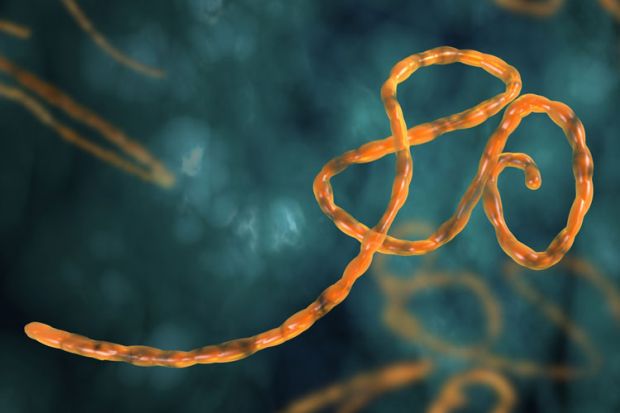Navarro College is not accepting any new applications from students residing in Africa – all of Africa, not just those five countries on the continent with confirmed cases of the Ebola virus.
The Texas community college made the news last week for sending rejection letters to Nigerian applicants that said “Navarro College is not accepting international students from countries with confirmed Ebola cases”. Navarro initially apologised for “misinformation” provided to prospective international students, but later, Dewayne Gragg, the college’s vice-president of access and accountability, issued an updated statement saying that administrators believe it to be the responsible course to postpone recruitment “in those nations that the Center for Disease Control and the US State Department have identified as at risk…We are eager to resume accepting student applicants from these countries as soon as possible.”
In an interview, Gragg clarified that non-African countries with Ebola cases – which would include Spain and, yes, the US (where Texas has been ground zero) – are not encompassed by the new application policy. By contrast, he said that the college’s policy is to return new applications from any African country.
Asked why the policy is so broad as to include prospective students in African countries without any Ebola cases, Gragg said the interview was getting into territory that isn’t relevant, but added, “We have made this decision based on what we feel is best for the safety of our students.”
“It wasn’t an easy decision, and yes we were probably one of the first if not the first to make a decision like that,” Gragg said. “We know that all the data says that it’s highly unlikely that we would admit somebody who would come to this school [with Ebola], but on the other hand we also know that if we did admit somebody who had Ebola and they came to this school we’d be 100 per cent wrong and for the safety of our students and our faculty and our community we chose not to take the chance.”
Federal health guidance does not recommend restrictions on enrolling Africans generally but instead advises risk assessments and monitoring for those who have recently returned to the US from Ebola-affected countries.
“Over all, colleges and universities are on the low end of risk,” said Craig M. Roberts, an epidemiologist for the University of Wisconsin at Madison’s University Health Services and a clinical assistant professor of population health sciences. Roberts, who is also chair of the American College Health Association’s Emerging Public Health Threats and Emergency Response Coalition, noted that about 36,000 people have entered the US in the last six months from the three African nations at the centre of the outbreak – Guinea, Liberia, and Sierra Leone – and only about 300 of them were college students.
That’s not to say colleges aren’t preparing for a potential crisis: Roberts had two Ebola-elated meetings on campus last Friday, and he expected much the same was true for administrators and medical officials on campuses across the country.
The American College Health Association created a new web resource on Ebola preparedness last week. The aforementioned guidance for colleges from the federal Centers for Disease Control and Prevention issued earlier in the academic year recommended suspending travel to Guinea, Liberia and Sierra Leone, and suggested risk assessments and health monitoring for students and faculty members who have been to countries with active Ebola outbreaks in the last 21 days (the virus’s incubation period). The CDC did not recommend that colleges isolate or quarantine faculty, students or staff based on travel history alone.
“Because we’re outpatient clinics, what we’re telling our members to do is prepare for not an outbreak of Ebola on your campus – that’s pretty unlikely – but to prepare for a single case or, what’s even more likely, a threat of a case, which is what happened at Yale this week,” said Roberts. (A doctoral student in Yale University’s School of Public Health who had recently returned from Liberia was hospitalised with a fever, but tests for Ebola were negative.)
Asked about an admissions ban like Navarro’s, Roberts said, “I don’t see any public health or medical reason to do that.” More broadly, he said he does worry about hysteria among individuals with no known exposure to Ebola or recent travel to areas of the outbreak, as well as the possibility of discrimination against individuals from affected countries - or, even worse, all of Africa.
“Many of us have seen this with Aids and HIV in the 80s, people coming in wanting to get a HIV test because they shook hands with a gay person. It’s bizarre, but it happens.”
Allan E. Goodman, president and chief executive officer of the Institute for International Education, said that universities have a long history of successfully managing public health crises from influenza to severe acute respiratory syndrome (Sars) to gun violence to natural disasters. “Colleges and universities have the opportunity to be a model practitioner of good public health practices and demonstrate to America and the world that we can have international students and we can have international programmes and we can have international admissions if we’re just prudent about how we do it,” he said.
Register to continue
Why register?
- Registration is free and only takes a moment
- Once registered, you can read 3 articles a month
- Sign up for our newsletter
Subscribe
Or subscribe for unlimited access to:
- Unlimited access to news, views, insights & reviews
- Digital editions
- Digital access to THE’s university and college rankings analysis
Already registered or a current subscriber? Login




